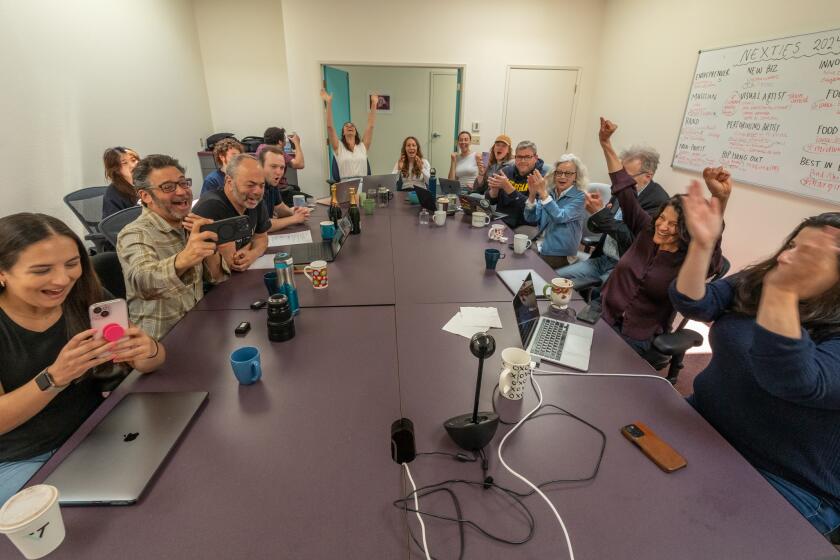Surrogate Parent Trial Nears End; Judge Is Likened to Solomon
In an emotional summation of a groundbreaking test-tube baby case, the lawyer for surrogate mother Anna L. Johnson likened the judge to King Solomon Wednesday and warned that denying Johnson parental rights is tantamount to murder.
Attorney Richard C. Gilbert urged Orange County Superior Court Judge Richard N. Parslow Jr. to establish a principle never before recognized in the law: That a woman who gives birth to a child made from another couple’s sperm and egg is as much the mother as the genetic parents.
“You are looking reality straight in the face and you see three parents,” Gilbert told the judge. “The question is, ‘Will you blink and turn your head?’ Would King Solomon solve a three-parent problem by assassinating one of the parents? You have no right to play God.”
Closing his remarks, Gilbert again referred to Solomon--a king of Israel whose wisdom was documented in the Old Testament--who determined which of two women was a baby’s true mother by threatening to cut the child in half.
“And so, King Solomon, what will it be?” Gilbert asked. “I give you three parents and a gun. Tell us your wisdom.”
“I think I’m being asked to split the baby,” Parslow replied.
The judge said he will rule Monday whether Johnson, a 29-year-old single mother with a 3-year-old daughter, has parental rights to the child she bore Sept. 19 for an infertile couple, Mark and Crispina Calvert. He must decide whether the baby boy has two parents--the Calverts--or three, including Johnson. Johnson is the first surrogate mother to seek parental rights to a child that is genetically unrelated to her.
The Calverts have temporary custody of the child, and Johnson is permitted to visit twice a week. If Johnson is found to be a legal parent, however, Parslow will hold a separate hearing to determine whether she is entitled to custody or permanent visitation rights.
The judge could also rule that although Johnson cannot be considered a legal parent, she has a lesser right that entitles her to participate in the child’s life. Such rights are frequently assigned to foster parents, grandparents or stepparents who can establish an interest in a child’s life.
Gilbert argued that it does not matter how a woman becomes pregnant or whose genetic material composes the embryo. The act of giving birth and the inevitable bond a woman makes to the fetus confers the rights of a mother, he said.
“Genetics means crap in determining parental rights,” Gilbert said.
But the Calverts’ lawyer, Christian R. Van Deusen, took the opposite view, saying a couple’s sperm and egg are “the most precious thing they have . . . their genetic heritage.” He said Johnson was trying to steal the Calverts’ child, and that permitting it would be against public policy.
“If the court were to endorse the conduct of Anna Johnson and the deception she has worked on these people, it would open the doors to exploitation of every infertile couple that comes down the way seeking to have a child by in-vitro fertilization,” Van Deusen said.
Van Deusen said the validity of the $10,000 surrogate contract signed by all three parties must be upheld. If men are permitted to sell their semen and people to sell their blood, a woman must have the right to choose to let another couple’s child grow in her uterus, Van Deusen said.
Harold F. LaFlamme, a court-appointed lawyer for the baby, said California law does not give Johnson parental rights.
Although one portion of the state civil code says a birth mother shall be presumed to be a baby’s natural parent--a section Johnson’s lawyers have repeatedly cited--another allows a woman to bring a court action to determine a mother-child relationship, LaFlamme said. That shows that the framers of the law knew that birth alone does not necessarily prove motherhood, he said.
“Simply carrying the baby isn’t enough to confer parental rights,” LaFlamme said.
If parentage is unresolved, the civil code dictates that blood tests provide the conclusive answer, and in that case, Johnson has no claim to parentage because she has no genetic relationship to the baby, he said.
That leaves her with only one other argument, which is the bond she claims to have formed with the child, LaFlamme said. That assertion is suspect because she has made contradictory claims to others and “suppressed vital information” from the Calverts to make certain they used her as a surrogate, LaFlamme said.
Van Deusen also attacked Johnson’s claim of developing a bond with the baby, saying she has no sincere interest in raising the child and was pressing her lawsuit for national attention as well as a chance to make money off a possible book or movie deal. Johnson has said she has made no such arrangements.
THE SURROGATE MOTHER SUIT
On Monday, Superior Court Judge Richard N. Parslow Jr. is expected to announce if surrogate mother Anna L. Johnson should be considered a legal parent of a child she bore Sept. 19 even though he is genetically unrelated. Johnson agreed to have a child made from the sperm and egg of an infertile couple, Mark and Crispina Calvert. But on Aug. 13, she filed suit seeking custody and parental rights over the boy. The Calverts have temporary custody. The case is unprecedented because other surrogate mothers suing to keep their children have been genetically related to their babies.
Johnson’s claim:
She contends that carrying and delivering the child, combined with the emotional bond she formed with the baby in utero, make her a legal parent of the infant. Johnson argues that the Calverts broke the $10,000 surrogation contract by paying her late, failing to buy her life insurance and neglecting her medical needs during the pregnancy. Her attorney contends that the contract is illegal because it amounts to baby-selling.
The Calverts’ claim:
The Calverts contend that their genetic link to the child makes them the baby’s only legal parents. They question the emotional bond Johnson claims to have with the infant, saying her custody battle is motivated by a desire for money and publicity. The couple say Johnson exploited them for money and duped them into the surrogation contract by withholding important information from them.
More to Read
Start your day right
Sign up for Essential California for news, features and recommendations from the L.A. Times and beyond in your inbox six days a week.
You may occasionally receive promotional content from the Los Angeles Times.






